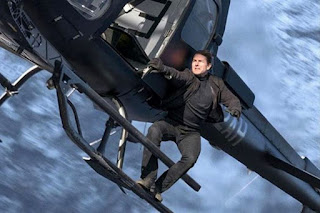The "First Man" dilemma
For some, that is not the only problem. Articles such as this one have pondered why "First Man" has not done as well at the box office as some expected. (Theories include conservatives' ire over the omission of a flag-planting scene, a comment by Ryan Gosling, strong competition from more obvious crowd-pleasers, and more.)
None of those issues factored into my thinking. As the son of a NASA engineer*and a pre-NASA NACA mathematician, I've embraced the "From the Earth to the Moon" miniseries, the films "Hidden Figures"** and "The Martian" and other space epics, and was more than ready for "First Man."
Chazelle, working from a script by Josh Singer based on James R. Hansen's book about Armstrong, had a laudable ambition in "First Man." He tries to show a young audience, far removed not only from the moon landing but the deaths and damage preceding it, that space travel was as gut-bustingly dangerous as its views from space were exhilarating. The movie does that in several ways, starting with scenes of Armstrong in a failed X-15 test and other scenes of disasters on the way to the moon.
. It veers away from a famous-astronaut narrative -- Gus Grissom simply appears, Deke Slayton's place among the original seven astronauts not worth discussing -- to show them as just people caught up in an remarkable time. "First Man" also makes this a family story, one where Armstrong's wife Janet (Claire Foy) and their children are less concerned with a man in space than with whether dad's going to come home again; the Armstrongs lose a young daughter and don't need any more suffering.
Foy, who played Elizabeth II in two seasons of "The Queen" and stars in the new "Girl in the Spider's Web," gives the most powerful performance here. That's in part thanks to Gosling's deliberate underplaying, showing Armstrong so constantly closed off from any sign of fear or worry (or loss) that he's almost unknowable. His opposite number is Buzz Aldrin (Corey Stoll), who seems to enjoy opening up doors the others would like to keep closed -- enjoys it to the point of sheer obnoxiousness in this telling. Armstrong does not want anyone -- his wife, his son, himself -- to imagine the worst that could happen.
In contrast, Foy does not have to exaggerate to forcefully tell him, and almost everyone else, know exactly what's on her mind; there's a fine moment when she's been cut off from an audio feed of one of Armstrong's flights and makes clear she'd rather know what's going on than be shielded -- so telling because Armstrong so constantly holds up his own shields.
But Armstrong in this film never lets us past those shields, and that may be key to what's so frustrating here. While he allows himself a small gesture near the end, it remains no more than a crack. That may well be what the real Armstrong was like. But, as is so often said of films based on real lives, this is not a documentary.
In a film that has spent so much time on both the perils of spaceflight and the marvel of touching a world no human has before, viewers deserve more of a celebration, more honor for what these folks endured. "From the Earth to the Moon" was in some ways an homage to the men in short-sleeved white shirts who figured out stuff, and it proved to be an epic drama. "First Man" is like watching Armstrong on his epic journey, then marking it by saying, "Not a bad job, Neil."
*I still learn things about what my dad did. Just now I came across a mid-'70s NASA budget report and this list of people involved in a House of Representatives field hearing:
Langley Research Center - Mr. Love, Dr. Michael, Dr. Cortright, Mr. English, Mr. Van Ness,Dr. Lawrence, Mr. Holloway, Mr. Llewellyn, Dr. Soffen, Mr. Guastaferro, Mr. Broome, Mr. Schade, Mr. Morello, Mr. Stickle, Mr. Bower, Mr. Nagel, Mr. Wells, Mr. Heldenfels, Mr. Reed, Dr. Whitcomb, Mr. Morgan
**My parents worked at the Langley Research Center, where "Hidden Figures" was set, and both my mom and her sister were mathematicians -- they were called "computers" -- there. My aunt married another NASA engineer. I told you I was a NASA baby.


Comments
Post a Comment